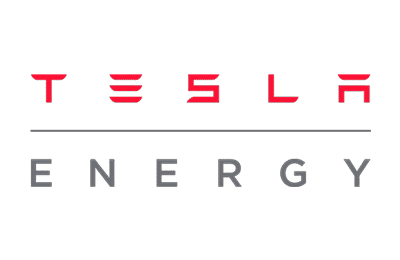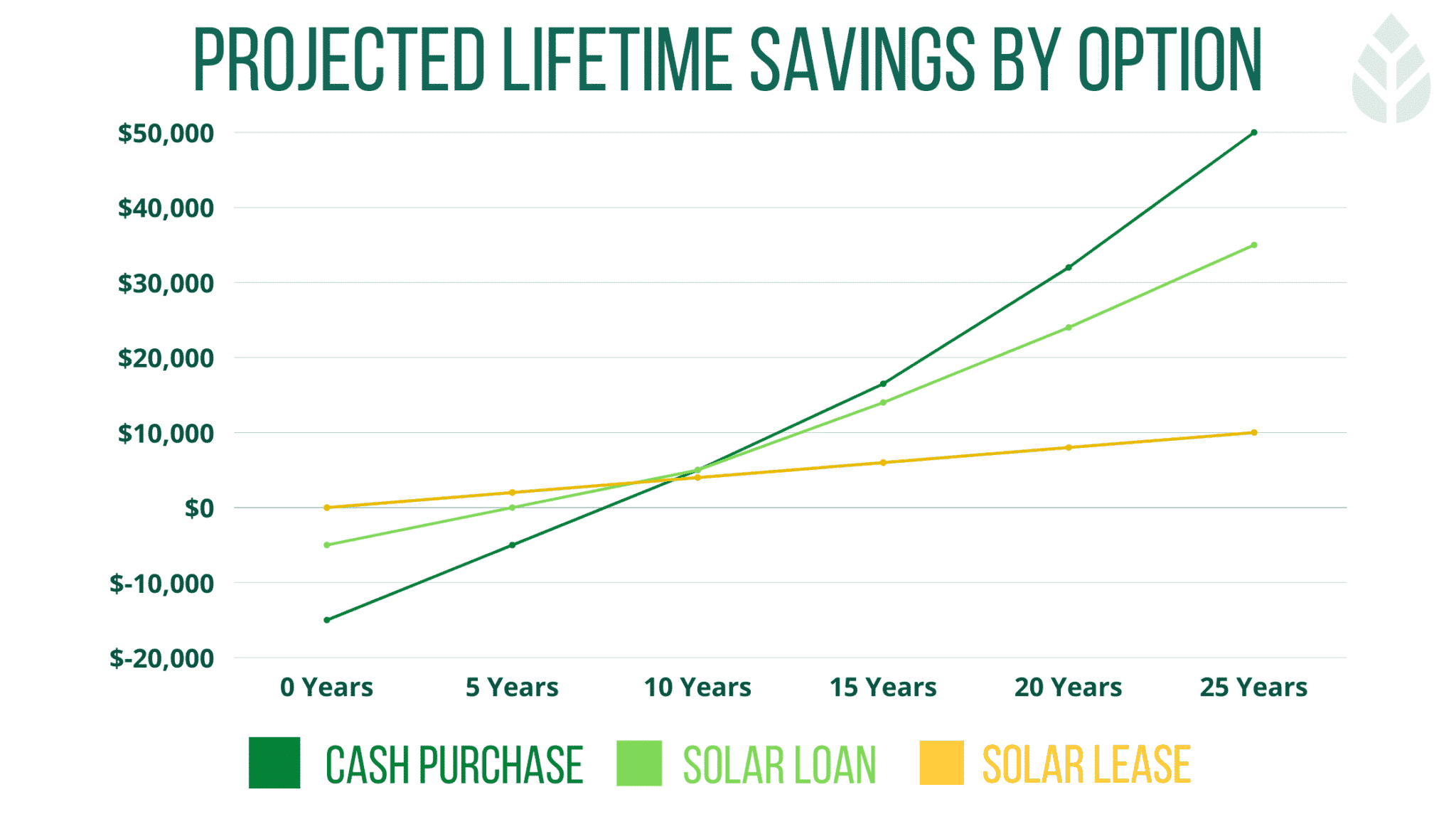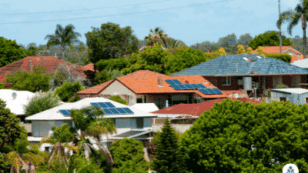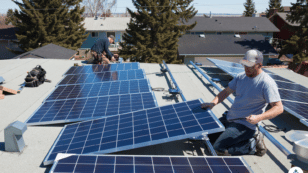
Top 7 Best Solar Companies in California (2024 Reviews)
In this guide on the best solar companies in California, you’ll learn:
- Who our top 5 picks are for solar providers in California
- How we evaluated California’s solar companies
- What Californians should look for when choosing a solar company
Each product and or company featured here has been independently selected by the writer. You can learn more about our review methodology here. If you make a purchase using the links included, we may earn commission.
California is the #1 state in America to go solar, which is why there are an incredible 1,103 local companies that handle solar panel installation. Installing panels in the Golden State can pay for itself and save you an average of around $34,829 after the system pays for itself, but choosing a disreputable company can mean your system ends up costing you rather than saving you money. This is especially true now that California has adopted net metering 3.0 (more on this later). It’s critical that you choose a company that’s professional and experienced.
In this guide, we’ll be discussing what we believe are the top best solar companies in California. We’ll explain what we like — and dislike — about each of them and why we believe each is well suited to handle your solar project.
What Are the Best Solar Companies in California?
We’ve reviewed countless solar installers in California and have used a rigorous grading methodology to rank them in terms of quality, affordability, trustworthiness and more. The companies below are the ones we believe are your best options in California:
- SunPower: Best National Provider
- ADT Solar: Best Warranty Coverage
- Tesla: Best Technology
- Elevation Solar: Best Customer Service
- Green Home Systems: Best Value
- SunLux Solar: Best Financing Options
- Stellar Solar: Best Local Expertise
Compare California’s Top-Rated Solar Providers
In the following sections, we’ll explain why we’ve hand-picked each of these solar panel installation companies as the best in your area. Overall, we strongly recommend you go with SunPower or ADT Solar, two of the top national companies in the solar industry. The table below provides a look at how these installers compare to other top picks in the state.
| Solar Providers | Superlative | Our Score | Avg Cost ($–$$$$$) | Warranty | Financing Options | Get Quote |
| SunPower | Best National Provider | 5/5 | $$$$ | Varies – minimum of 25 years for equipment, workmanship and production | Cash, solar loan, solar lease, PPA | Get Quote |
| ADT Solar | Best Warranty Coverage | 4/5 | $$$ | 25 years for equipment, workmanship and production | Cash or solar loan | |
| Tesla | Best Technology | 4.5/5 | $$ | 25 years for equipment and performance; 10 years for workmanship | Cash, solar loan, solar lease, PPA | Get Quote |
| Elevation Solar | Best Customer Service | 4/5 | $$ | 25 years for equipment and performance; 30 years for workmanship | Cash or solar loan | Get Quote |
| Green Home Systems | Best Value | 4.5/5 | $$ | 25 years for equipment and performance | Cash or solar loan | Get Quote |
| SunLux Solar | Best Financing Options | 4/5 | $$$$ | 25 years for equipment, performance and workmanship | Cash, solar loan, solar lease, PPA | Get Quote |
| Stellar Solar | Best Local Expertise | 4.5/5 | $$$$ | 25 years for equipment, performance and workmanship | Cash, solar loan and solar lease | Get Quote |

SunPower
Pros
- Most efficient panels on the market
- National coverage
- Cradle to Cradle sustainability certification
- Great warranty coverage
Cons
- Expensive
- Customer service varies by local dealer

Tesla Energy
Pros
- Price-match guarantee
- Sleek, efficient and durable solar panels
- Best solar battery on the market
Cons
- Some reported issues with customer service
- Customer service varies by local dealer
Tesla offers some impressive solar technology. Its panels have an above-average efficiency rating and outstanding performance specifications. Tesla also offers price matching, which means its panels are some of the most affordable.
Tesla sometimes struggles to provide good customer service, but we feel its technology still makes it a good option for Californians.
Why We Chose Tesla for the Best Technology
Tesla panels’ efficiency rating is above average and somewhere around 21.5%. The high expected production rate of its panels makes it a great option for taking full advantage of the abundant sunlight in California. That also means they should be able to offset a good portion of the average monthly energy consumption of 572 kWh. Combined with batteries, you could potentially eliminate your electric bill, an average savings of $169.20 per month or over $2,000 annually.
Tesla also installs its own solar roof. You can also get the Tesla Powerwall from Tesla, which is the most sought-after solar battery in the industry, thanks to its performance specifications and features that make using the battery in conjunction with your panels and the Tesla app streamlined and convenient.
Tesla also makes going solar accessible by offering all four primary financing options for solar panels, as well as price matching. This is a great way for Californians to save, especially since the per-watt price for PV equipment in the state is above the national average, and batteries are all but necessary now.
Lastly, Tesla installs EV chargers alongside its other products. Since EVs are massively popular in California, this is an add-on many customers will choose.
What We Don’t Like
The biggest downside to going solar with Tesla, in our opinion, is the customer service. Since the company is very large, it outsources all installations to certified third-party installers rather than using an in-house installation team. The issue with this is that some installers provide poor customer service, which can include installation delays, slow response times to warranty claims and a lack of professionalism.
The experience you have will depend heavily on the company that’s assigned to your solar project.
Another minor downside to working with Tesla is that it only installs its own products.
Read our full review of Tesla for more information.
Solar Products
In terms of solar panels, Tesla only installs its own Tesla-branded modules, which are now manufactured by Q Cells. These are tier-one panels that have a great efficiency rating and an impressive datasheet, but it would be nice to see other panel options. With that being said, the Tesla panels are all black and don’t have visible gridlines, so they are quite sleek and appealing to most homeowners.
Given the performance and below-average price tag of around $3.25 per watt, we feel these panels are some of the best for California residents looking for good performance and energy savings on a budget.
Tesla installs a slew of other products as well, which we’ll list below:
- Tesla solar roof
- Tesla Powerwall
- Tesla EV chargers
- Tesla solar monitoring mobile app
The Powerwall from Tesla is the most popular solar battery in the industry, and since batteries are increasing in popularity, we love to see this option available from any installer.
Financing Options
Tesla accepts cash purchases, loans, leases and PPAs, just like SunPower. This is great news for homeowners throughout California, including those who can’t justify spending tens of thousands upfront on their system and those who don’t have the credit to qualify for a loan.
As we mentioned before, we strongly recommend a cash purchase if you can swing it because this option will provide you with the shortest panel payback period and the highest savings over time. A loan would be our next most recommended option, followed by a lease and, finally, a PPA if none of the other options work for you.
Warranty Information
Tesla has less impressive warranty coverage than some of its competitors, overall.
The warranty that covers manufacturer defects lasts for 25 years, which is the industry average. The same applies to the performance of the panels, which is slightly above the industry average.
The workmanship warranty, though, only lasts for ten years. This is also in line with the industry average, but it pales in comparison to the 25-year coverage you’d get from SunPower or ADT. With that being said, Californians see well below-average amounts of rainfall, so the risk of roof leaks resulting from poor installation technique is low.
Facts and Figures: Tesla Energy
| EcoWatch Rating |
|---|
| Better Business Bureau (BBB) Rating |
| Average Cost ($-$$$$$) |
| Solar Services |
| 4.5 |
| C |
| $$ |
| Solar Panels, Solar Batteries, EV Chargers, Solar Roof Shingles, System Monitoring |

Elevation

Average cost
Pros
- Comprehensive service offerings
- Outstanding customer service
- Full-service home energy solutions
Cons
- Limited service area
- Quality of installation may vary by location
Elevation Solar offers a more customized and customer-focused experience than most, plus outstanding customer service that’s unmatched in the area.
Elevation Solar is younger than many of its direct competitors, although it has already established a positive reputation of reliability for itself.
Why We Chose Elevation Solar for the Best Customer Service
Elevation Solar is a large regional company, but its individual branches offer the kind of customer service and care that you’d expect from a mom-and-pop shop. Its 4.0 rating on the Better Business Bureau (BBB) is a good indication of just how great the customer service is, as many competitors have scores closer to 2.0 and 3.0.
Perhaps most importantly, the team is familiar with state and local incentives, which are some of the best ways to save money on your solar project. The representatives are always willing to help you file for rebates and tax credits offered by your state, city or utility company. This type of one-on-one service can end up saving you hundreds or thousands of dollars.
Elevation also has outstanding warranty coverage and is known for fast response times to warranty claims.
Finally, we’re happy to report that Elevation provides a wide range of services beyond solar panel installation for system customization.
What We Don’t Like
Elevation Solar was founded in 2014, so it has less than a decade of experience. This may seem like a pretty substantial amount of time, but it’s not long enough for the company to have seen a full lifespan of even a single solar array.
Younger companies like Elevation are less established, and if they end up going out of business, you could be left with voided warranty coverage.
The company only accepts cash purchases and loans. These are our preferred options, but we like to see companies accepting leases and PPAs, as cash payments and loans are out of the question for many homeowners. Again, more affordable financing is going to be a necessity for many California solar customers, especially now that batteries are less of an option and more of a necessity.
Solar Products
Elevation Solar installs panels from REC and Tesla, both of which are tier-one panel manufacturers and offer modules with above-average efficiency ratings.
As we’ve already mentioned, high efficiency ratings are important in California, as they help insulate you from the above-average energy rates. This is especially true now, as the state has done away with net energy metering (NEM) 2.0 and has adopted the less appealing NEM 3.0. Higher efficiency panels will save you more with this reduced credit rate for excess energy, and you’ll experience fewer instances of usage outpacing production.
Elevation also offers the following products and services:
- Tesla Powerwalls
- Generac PWRCells
- Energy efficiency home improvements, including installing new insulation and home sealing
- Smart home energy solutions, including smart thermostats, Energy Star-certified products and curb energy monitoring
The multiple options for batteries are great to see, especially since NEM 3.0 now makes batteries significantly more worthwhile.
Financing Options
Elevation Solar is another provider that only entertains cash purchases and solar loans. We do recommend these options over leases and PPAs, but we rank companies higher that accept these alternatives, as they make going solar more affordable and accessible, especially in an area like California, where the per-watt price for PV equipment can climb slightly above-average and batteries are usually required to save over time.
Warranty Information
Elevation Solar offers outstanding warranty coverage that rivals many of the best national providers. You get 25 years of coverage for the equipment and the performance, plus a 30-year warranty for the workmanship.
Both the performance and workmanship warranties are above-average. The risk of roof leaks in CA is relatively low due to the minimal rainfall every year, but it’s still nice to know that you’re getting a safe and professional installation that’s covered for decades and won’t cause damage to your solar PV panels or your home.
Generally speaking, the panels installed by Elevation should last for a minimum of 25 years.
Facts and Figures: Elevation
| EcoWatch Rating |
|---|
| Better Business Bureau (BBB) Rating |
| Year Founded |
| Average Cost ($-$$$$$) |
| Solar Services |
| Brands of Solar Equipment Offered |
| Warranty Coverage |
| 4 |
| A+ |
| 2014 |
| $$$ |
| Solar Panels, Solar Batteries, Energy-Efficiency Upgrades, Smart Home Energy Solutions |
| REC, Tesla, SolarEdge |
| 25-year manufacturer warranty |

Green Home Systems

Average cost
Pros
- Outstanding customer service
- Expansive service area
- Offers products from leading manufacturers
- Multitude of products and services
Cons
- Relatively young company
Green Home Systems (GHS) offers affordability and unrivaled customer service. The company takes amazing care of all of its customers and offers a truly personalized solar conversion experience.
GHS doesn’t have a workmanship warranty, which is a pretty significant downside, and it also doesn’t accept leases or power purchase agreements.
Why We Chose Green Home Systems as the Best Value
Green Home Systems installs high-quality equipment and provides stellar customer service, but the company still manages to charge prices that are below the average in the area. You could save $1,000 or more on your system just by choosing a more affordable company like GHS.
GHS provides access to a wide range of panel brands, ranging from low-cost and moderate-efficiency options to moderate-cost and high-efficiency options for customization. This is great news for California, especially since customers in northern regions are usually going to need higher efficiency ratings than those in southern parts of the state. If you have a high solar irradiance in your area, you could save on your system by choosing a more affordable panel through GHS.
Most importantly, GHS is known to be a reliable and trustworthy installer that provides excellent customer service and customer support. The company has a near-perfect 4.76 rating on BBB and a 4.4-star rating on Google Reviews.
This means you get the kind of care and attention you deserve, which also comes along with the peace of mind that your installer stands behind its work and its products. It also means that your installer is willing and able to help you apply for solar incentives and rebates. This is especially helpful in California, where solar incentives abound and can quickly get confusing.
What We Don’t Like
The company doesn’t offer a workmanship warranty, so any issues that come about due to improper installation technique won’t be covered. Thankfully, these are few and far between because the company uses in-house installations only and employs true professionals.
Second, GHS doesn’t accept leases or PPAs. While its low pricing makes its products and services more accessible than most companies, some Californians who can’t make a cash purchase or solar loan work will need to choose a different provider entirely. Given the high cost of living in the Golden State and the high demand for solar batteries to push savings higher with NEM 3.0, the chance of needing a PPA or lease is higher than normal.
Solar Products
Green Home Systems installs panels from Panasonic, QCells, LONGi and United Renewable Energy Company (URE).
These are all excellent options and have efficiency ratings that reach above 20%. The URE panels are likely going to be the most affordable, but they do have the highest degradation rate — 2% in year one and 0.63% each year thereafter. Therefore, they’ll likely provide sufficient energy initially but are less likely to offset your energy bills over time. This is especially true compared to average degradation rates in the industry, which are 2.5% in the first year but a lower 0.4% in subsequent years.
We’ll include a brief list of the other equipment options from GHS below.
- Solar roofing, including PV roof shingles from Apollo
- Enphase, SolarEdge and Solar Ark inverters and microinverters
- Enphase IQ batteries
- LG Chem Prime batteries
- HomeGrid Energy batteries
- SolarEdge optimizers, which can boost production in shade
- Backup generators
- Span Smart Electrical Panels
Since most Californians will need batteries to save with their solar arrays, the myriad of options available from GHS are outstanding.
Financing Options
As mentioned above, Green Home Systems only accepts cash purchases and solar loans. These are our preferred and recommended options, but we do prefer companies that also accept leases and PPAs to keep their products and services as accessible as possible.
With that being said, GHS does have below-average pricing, so, even though it doesn’t accept leases or PPAs, it is more likely to fit into your budget than most competitors. If the need for batteries is pushing your installation costs too high for a cash purchase or loan, then GHS might not be ideal for you.
Warranty Information
The warranty coverage is another area where GHS falls a bit short. It offers a 25-year warranty for the equipment and the panel performance. We believe these are the most crucial coverages to have in California, as you want to keep efficiency as high as possible to offset your above-average energy rates.
However, there is no workmanship warranty. This doesn’t necessarily suggest that the installation services won’t be as professional or high-quality as they will be from other companies, but it will be a bit concerning for many homeowners.
Facts and Figures: Green Home Systems
| EcoWatch Rating |
|---|
| Better Business Bureau (BBB) Rating |
| Average Cost ($-$$$$$) |
| 4.5 |
| A+ |
| $$ |

Sunlux
Pros
- Covers panel maintenance for 25 years
- Offers rewards for customer referrals
- In-house roofing services
Cons
- Slightly limited service area
- Relatively young company
SunLux accepts all four major solar system payment options, and its financing program is especially desirable due to the low interest rates and no down payment requirements.
SunLux is a bit on the expensive side, but we believe it’s well worth the investment.
Why We Chose SunLux as the Best for Financing Options
SunLux accepts cash purchases, loans, leases and “pre-paid solar” agreements, which is what the company calls a PPA. This leaves its services and products accessible to most residents, even though you’ll likely need batteries to make your system worthwhile.
Additionally, the loan options are quite appealing. SunLux’s financing partners all offer only secured loans, so they generally have lower credit score requirements and lower interest rates. The company also has $0-down loans available, so most customers should be able to go solar with this provider. This is great to see in a high-cost area like California, where panel prices are a little high and batteries make for a much higher installation cost.
SunLux has an A+ rating and close to a 4-star review score on the BBB’s website, which is well above average. It’s also known to provide excellent customer service.
Finally, SunLux offers above-average warranty coverage, including 25 years of protection for the equipment, the panel performance and the workmanship. The workmanship warranty, in particular, is superior to what you’d get from most of the competition, and the coverage, in general, provides peace of mind that your system will be installed properly the first time around.
What We Don’t Like
The primary downside to choosing SunLux to handle your solar project is that its prices are above average—close to $4.00 per watt as opposed to the state average of $3.33. While most residents will pay around $13,986 for their system after the tax credit, the average cost for a system from SunLux is closer to $16,800.
SunLux is a small local company, so its service area doesn’t span the entire state. It has offices in Los Angeles, Bakersfield, San Diego, Rancho Cucamonga, Valencia, Irvine and Rancho Santa Margarita, so it really only services Southern California.
Solar Products
SunLux installs panels from Panasonic and QCells, both of which should provide sufficient efficiency ratings for Californians.
Panasonic panels are going to be the better option, in our opinion. They have a higher efficiency rating and an industry-leading temperature coefficient, so they will lose the least efficiency in the hotter climates of Southern California.
SunLux also installs quite a few other solar products, including the following:
- Tesla Powerwalls
- LG Chem solar batteries
- Enphase IQ solar batteries
- SolarEdge and Enphase inverters
- Enphase and Tesla solar monitoring apps
- Siemens VersiCharge and SolarEdge EV chargers. These are super popular in California, where EVs take up around a fifth of the automobile market share and help residents combat some of the highest gas prices in the nation
- Smart Home Systems
- Roofing products from Timberline and Grand Sequoia
Once again, the wide range of battery options in an area where net metering makes batteries mostly necessary is great to see.
Financing Options
SunLux accepts all of the standard payment options, including cash purchases, solar loans, leases and PPAs, which the company calls “pre-paid solar.”
As is the case with any installer, we recommend choosing a cash purchase if you can to maximize your long-term savings. We’d recommend a loan next, then a lease and finally a PPA if the other options don’t work for you. However, the no-money-down, low-interest solar loans from SunLux should be accessible to most customers, especially since they are secured loans that have fewer credit score restrictions. This company should be affordable even if you couple your panels with batteries, as most Californians now are.
Warranty Information
SunLux includes a comprehensive 25-year warranty with all of its installations. That warranty covers manufacturer defects, the workmanship involved with installing your equipment and the panel performance. This is the same warranty coverage you’ll see from many of our top picks, but it’s better than the industry average.
The panels installed by SunLux should last for 25 to 30 years before needing to be replaced.
Facts and Figures: Sunlux
| EcoWatch Rating |
|---|
| Better Business Bureau (BBB) Rating |
| Average Cost ($-$$$$$) |
| Solar Services |
| 4 |
| A+ |
| $$$$ |
| Solar Panels, Solar Batteries, EV Chargers, Roofing Services, System Monitoring, Maintenance & Repairs |

Stellar Solar
Pros
- Educational, no-pressure sales approach
- Offers products from leading manufacturers
- Representatives are experts on local policies
Cons
- Slightly limited service offerings
Stellar Solar is based in and services Southern California, and its team is knowledgeable about the area and equipped to install the ideal solar array.
Stellar Solar is rather expensive, and it has a small service area. However, we think the investment is worthwhile.
Why We Chose Stellar Solar as the Best for Local Expertise
Stellar Solar is our top pick for residents looking for professionalism and knowledgeable technicians. The company was founded in 1998, and since then, its installers have been exceeding expectations and providing localized knowledge and experience to install customized solar arrays.
As a small, local company, Stellar is able to focus on customer experience and satisfaction, which is a big reason why the company has an unheard-of 4.96 rating with the BBB and a 4.8 rating on Google Reviews. Just about every customer is overjoyed with the service and attention they receive.
Plus, the company takes a no-pressure, educational approach to solar sales, which is refreshing in a highly competitive market like California, where many companies just push for maximum sales.
Stellar Solar’s representatives are experienced with the local solar perks and benefits and are always happy to help you file for them and save.
Finally, Stellar provides above-average warranty coverage.
What We Don’t Like
Stellar is a small company, and while that means it has the opportunity to offer great customer service, it also means the number of customers that have access to its products and services is limited. Stellar Solar is only available to customers in Southern California.
Stellar Solar is comparable in price to SunLux, so you can expect to pay an additional $1,200 to $1,800 or so for your solar array, which is around 10% higher than what you’d pay with most competitors.
We do feel the investment is worth it, especially since the company can sometimes save you money by filing for incentives for you.
Solar Products
Stellar Solar only installs SunPower panels, including the newer Maxeon line. These panels are considered the best in the industry for residential solar systems, and although they’re quite expensive, we feel they’re worth it. This is especially true of the Maxeon panels, which now come with an industry-defining 40-year warranty.
One thing Stellar Solar offers that most other companies don’t is the option for ground-mount solar systems. If you’re concerned about roof penetrations leaking over time, don’t like the look of rooftop solar panels or just have extra land you want to make use of, ground-mounted panels can be a great option.
Below is a list of other products Stellar installs:
- Tesla Powerwalls
- Enphase IQ solar batteries
- LG Chem solar batteries
- EV chargers
Having access to three different kinds of batteries is stellar, especially since you’ll likely need batteries to make your system worth it with the new net metering program in California.
Financing Options
Stellar Solar accepts cash purchases, loans and leases. It discusses PPAs on its website and explicitly lets customers know that they’re not advisable, so it doesn’t offer them. We’d normally deduct points in our ratings for this, but since the company accepts leases — which are basically accessible to everyone — we still think Stellar shines here. Leases can still cover panels and batteries, so Stellar should remain accessible to most residents.
We’d still recommend a cash purchase or a loan, though. Stellar has super accessible and affordable loans, which include no-money-down options and no interest paid for 18 months.
Warranty Information
Stellar Solar offers a 25-year warranty with all of its installations, and that covers the equipment and the panel performance. The workmanship warranty comes directly from SunPower and lasts for 25 years as well, making this a great option all around for protection and peace of mind.
Generally speaking, the SunPower panels from Stellar should last for between 25 and 40 years, as they are some of the most durable options available.
Facts and Figures: Stellar Solar
| EcoWatch Rating |
|---|
| Better Business Bureau (BBB) Rating |
| Average Cost ($-$$$$$) |
| Solar Services |
| 4.5 |
| A+ |
| $$$$ |
| Solar Panels, Solar Batteries, EV Chargers |
Watch Below: California Updated Their Net Metering Policy. What Does That Mean For You?
How Can You Save Money on California’s Best Solar Companies?
The average cost per watt of solar in California is around average, sitting at $3.33. But because solar goes further in the Golden State, it offers more value in California compared to the majority of states.
That’s mostly thanks to the availability of sunshine, allowing a smaller system to work more efficiently. As such, the average California homeowner can power their home with a relatively small 6 kW system, compared to the national average 9 kW system.
| Location | Pre-Incentive Cost for Average Solar System |
| California | $19,980 |
| U.S. Average | $29,970 |
The typical solar panel system costs a California homeowner $19,980, while the average U.S. homeowner pays $29,970. These figures are also before applying any solar incentives and assuming top-quality brands. After the federal credit, you’re looking at $13,986 in California.
Keep in mind that the recent shifts in 2024 in the net metering policy in California mean that batteries are often required to save money over time with solar. Most homeowners in the area need one or two batteries, depending on the capacity, which will add an average of $10,000 or $20,000 to your system costs, respectively.
Even accounting for the added cost of batteries, you should save over $34,000 in California by switching to solar.
There are also several ways you can save money on going solar in California:
- Take advantage of solar incentives and rebates
- Compare types of solar equipment
- Shop solar panel companies
- Pay in cash if possible
- Find out if solar leases are right for you
We’ll discuss how you can save money when buying solar panels in California below. But first, here are our preferred picks:
Take Advantage of California Specific Solar Incentives and Rebates
There are a number of solar incentives in California — including tax credits, exemptions and rebate opportunities — that make installing solar photovoltaic (PV) systems more affordable for residents while helping the state produce more clean energy. Below is an overview of those incentives:
| California Solar Incentive | Incentive Overview |
| Federal Solar Tax Credit (ITC) | The federal solar investment tax credit, or ITC, allows homeowners to claim 30% of their system costs as a credit against the federal taxes they owe. As it stands, the credit is set to reduce to 26% in 2033 and 22% in 2034 and will be eliminated for residential systems in 2035.1 |
| Net Energy Metering (NEM) | Net Metering allows customers to feed excess energy generated by their solar panels back to the local power grid. In exchange, customers receive credits from their utility companies that can be applied to future energy bills. California has historically offered one of the nation’s best net metering programs, compensating its solar customers at full retail rate. However, the program recently went through changes that made it much less beneficial. |
| Self-Generation Incentive Program (SGIP) | The SGIP as described by the California Public Utilities Commission (CPUC) offers rebates for installing energy storage systems at both residential and non-residential facilities.2 Making getting a favorite battery, like the Tesla Powerwall more afforable with increased savings. |
| SGIP Equity Resiliency Program | Offered as an additional incentive within the SGIP program, California provides additional rebates of either $850 or $1,000 per kWh of battery storage. This program works primarily with low-income households and families living in areas prone to wildfires or power outages.3 |
| Single-Family Affordable Solar Homes (SASH) Program | The California Solar Initiative (CSI) launched its SASH program (aka DAC-SASH) to provide fixed, up-front incentives on qualifying affordable single-family housing.4 |
| Active Solar Energy System Property Tax Exclusion | This incentive ensures the addition of a solar panel installation doesn’t raise homeowners’ property taxes.5 |
| Local Solar Incentives | Some local utility companies and municipalities offer their own solar incentive programs. For example, The Rancho Mirage Energy Authority offers a $500 rebate to its residential customers who install or expand a home solar system, and the Sacramento Municipal Utility District offers up to $2,500 for solar users with battery storage systems. |
Net energy metering (NEM) is often a great way to benefit financially from your solar panels. However, California’s new net metering 3.0 policy makes the program much less beneficial. You’ll likely need batteries to offset electricity consumption and save the average $34,829 over the lifespan of your system.
Compare Types of Solar Equipment
Just like clothing brands, solar equipment brands come with their own price tags and level of quality. Solar panel systems are sized by watt, and different types of solar panels have varying watt output.
California sees ample sunshine, so you may be able to power your entire home even with a cheaper solar panel that produces less energy (for example, buying an older 350W model instead of a cutting-edge 400W). Or, you can pick high-efficiency PV panels and install fewer of them. Either way, you’re saving money.
If you don’t live in an area prone to power outages, you can also save by skipping out on a solar battery installation. However, keep in mind that utility companies, like PG&E, will frequently perform public safety power shut-offs when there are wildfire risks, which have been especially frequent up and down the Golden State.
Shop Different Solar Companies in California
California is home to nearly 900 registered solar installers, which means you’ll have plenty of options when it comes to choosing a solar company.6 We’ve outlined the top five best solar installers in California in this article — don’t hesitate to reach out to each one and compare quotes to ensure you’re getting the best deal. If you get a quote from one solar company but prefer another, see if they’ll match the rate.
Pay for Your System in Cash (If You Can)
The method you choose to pay for your solar panels will alter the total cost of installation. We recommend paying in cash if you can. Of course, cash purchases require the highest payments up front, but they save the most over time because they don’t require you to pay interest. Solar loans make your equipment more affordable up front, but they save slightly less because they include interest paid over time.
Luckily, California has plenty of financing programs to make solar more affordable and accessible to most homeowners. For example, Property Assessed Clean Energy (PACE) programs are available to the majority of homeowners, and they serve to reduce financing costs and up-front payments for solar systems.7
Keep in mind that savings in California are likely only possible if you couple your panels with batteries, which will push up installation costs quite a bit. Solar is still worth it in California, but the upfront cost is significantly higher.
Will Solar Increase Your Home Value In California?
Multiple studies have shown that solar panels do increase the value of a home, including a 2022 EcoWatch Solar Growth Outlook survey where 63% of respondents said they would pay more for a home with solar panels than a home without.
A study from Zillow revealed that homes with solar installations tend to sell for about 4.1% more on average than homes without solar. The study specifically examined the housing market in Riverside, California, reporting that homes with solar energy systems went for roughly $9,930 above market value.8
And an older study from the Lawrence Berkeley National Laboratory revealed that home resale value jumps by nearly $6,000 for each kilowatt of solar that’s installed.9
DIY vs Professional Solar Installation in California
Installing solar panels in California is a worthy decision for many reasons, but the cost may lead to some hesitancy. Many homeowners may look to install DIY panels to avoid solar panel installation costs. But is it a good idea?
Here are a few things to consider:
- How much do you save with a DIY solar panel installation?
- Are you capable of installing your own solar panels?
- Is the cost saved from DIY worth the risks?
How Much Do You Save With a DIY Solar Installation in California?
According to the U.S. Department of Energy’s National Renewable Energy Laboratory, labor typically accounts for about 10% of the total cost of solar installation.10 In California, that could lead to savings of $1,638.
Are You Capable of Installing Your Own Solar Panels?
There are people recording DIY solar panel installations on YouTube. So you may be thinking, how hard can it be?
The answer: it’s more complicated than you think. Unless you’re certified in a similar trade, we don’t recommend installing your own solar panels. Solar contractors have to go through rigorous training and licensing because there are complexities to the job.
Plus, solar companies have software designed to find the exact angle and placement of panels to maximize production, which can lead to savings of well over $1,600 when you consider 25 years of production. If you install your solar panels improperly or get a DIY solar panel, you’re not going to benefit as much as you could.
Is the Savings of DIY Solar Installation Worth the Risks?
While it sounds nice to save, you have to think about the risk involved in installing your own solar panels. DIY installations can be dangerous, as you’ll be up on the roof and dealing with direct electricity and wires. If you’re not 100% confident in what you’re doing, chances are higher that you could install them improperly, damage your solar equipment or even damage your roof.
Bottom line, unless you have relevant experience, we don’t recommend DIY solar panels installations.
What Should California Residents Look for in a Solar Installer?
California has hundreds of solar installers all competing for your business. The state is also home to high energy costs and frequent outages, which make for a unique energy market. With that in mind, we recommend considering the following factors when choosing the best company for your installation:
- Local reputation and reviews
- Solar pricing and financing
- Services offered
- Warranty coverage
- Company experience
- Brand quality
Local California Reputation & Reviews
We read through dozens of customer reviews and complaints from fellow California homeowners, as well as examining each company’s Better Business Bureau (BBB) score. Companies like Stellar Solar score well in this category thanks to its excellent local reputation, proven by the success of its referral network.
We also recommend working with a company that maintains membership in the Solar Energy Industries Association (SEIA) or other professional associations. Membership in these groups is a great indicator of the company’s professionalism, workmanship, reputation and reliability.
Solar Pricing and Financing
Sticker shock is common with solar systems, especially now that the new net metering policy makes batteries a necessity for most customers. However, keep in mind that you’ll ultimately save money in the long run, thanks to the reduced energy costs. In addition, California offers statewide solar incentives that can help you reduce these upfront costs. We give high scores to companies that offer a wide range of solar financing options, as well as have proven experience navigating the many statewide incentive programs of California.
Services Offered in California
For one, it’s important to note that different solar companies may offer slightly different services. Most California homeowners will want a company that provides a wide range of services, assisting with everything from initial consultation to panel installation to applying for financial incentives. Since power outages and EVs are very common in California, we place special weight on companies that have ample experience installing solar batteries and EV chargers.
Warranty Coverage
Finally, we recommend seeking an installer that can offer a good warranty. Panels can last 25 to 30 years, and you will want to ensure your investment is protected for as long as possible. The top solar installers will offer 25-year warranties for roofing, performance and workmanship.
SunPower, ADT Solar and NRG Clean Power all offer comprehensive warranties of at least 25 years, hence why they scored well in this category.
Californian’s Company Experience
We typically only recommend solar companies that have at least 10 years of experience. In most cases, the more experience, the better. With more than 900 solar installers to choose from in California, a company that has a long track record and customer referrals is a strong sign that it’s a good company to work with.
California also has a lot of local solar policies promoting certain residential solar add-ons, like EV chargers and energy storage devices. As a result, installations with add-ons are much more common here compared to other states. You want a company that knows California well.
Brand Quality
Pay attention to the specific type of solar technology in panels that is offered. Some companies, like SunPower, can exclusively offer best-in-class solar modules, while others may have a variety of products better suited for a budget-minded customer. Is the company certified to install leading brands like Tesla, Panasonic and LG? It never hurts to take a closer look into the company’s tech portfolio. If you have a specific brand of solar panel or battery in mind, check that the company you’re speaking with is certified to sell and install those products.
Methodology: How We Reviewed the Best Solar Companies in California
When we review solar installers in California, we have to be extra fastidious because there are over 1,100 installers that operate within the state. We look at many different factors to determine how likely a company is to provide above-average customer service, high-quality equipment and, most importantly, energy savings. We’ll explain the criteria we used to rank California solar companies below.
- Local reputation and reviews (20%): First and foremost, we weed out the many companies that crop up just to take advantage of the high demand for solar in CA by assessing a provider’s local reputation. We do this by looking at ratings on BBB, Google Reviews, Yelp and TrustPilot. We also read through dozens of reviews to gauge how well the company serves its customers and where it falls short in comparison to other providers.
- Pricing and financing (20%): Next, we consider the overall pricing and the financing options the company has available. The price per watt for PV equipment in California is above the national average, so companies that maintain below-average pricing get ranked higher. Plus, with above-average costs, companies that accept multiple financing options for homeowners of all financial backgrounds get higher ratings, as they help keep renewable energy more accessible.
- Services offered (20%): We prioritize companies that offer more than the basic services, which usually include panel and solar battery installation. EVs are particularly popular in California, so we look specifically for this service. We also prefer companies that offer energy efficiency home improvements and smart home energy systems, as California is very energy conscious, in part because of the above-average cost of electricity.
- Warranty coverage (20%): Warranty protection is always going to be important for solar, especially because of the high cost of converting. Unlike in rainier states, we prioritize equipment and performance warranties in California. Performance guarantees, in particular, help make the most use of the available sunlight in CA and help offset more of those high electric bills.
- Company experience (10%): Since California is the #1 state for solar conversion — according to the Solar Energy Industries Association (SEIA) — there are naturally more installers that pop up to capitalize on the demand. We prioritize installers that have over a decade of experience. Not only are these generally more reliable and knowledgeable about the area, but they’re also less likely to go out of business and take your warranty coverage with them.
- Brand quality (10%): Finally, we consider the brands of solar panels and other equipment a company carries. We prefer installers that offer tier-one panels and sought-after batteries, but we also love when companies have varied equipment that can appeal to customers who want maximum efficiency and those who are more budget-conscious.
Read More About Going Solar in California
FAQs: Best Solar Companies California
California is one of the biggest solar markets, which means your questions about going solar set the tone for the future of solar. If you have specific questions that aren’t answered here, reach out to our team of solar experts at solar@ecowatch.com.
To find the most affordable solar company in California we recommend getting a few quotes from solar companies to compare and contrast total costs. Doing so will allow to gain more insight once each company conducts an energy audit. You can also compare financing options as well: Is it better for you to pay in full, lease, or take out a loan? What solar incentives or solar rebates are available in California? Does it explain the federal tax credit? Does the company offer any of its own PPAs? Is net metering offered?
Overall, it’s a combination of solar panel efficiency and weather. Demand for solar is surging in California, and that means rates are also competitive. However, California is a deregulated energy market and a state that has experienced extreme weather over the last few years. A business prepared to address these factors will prove to be the best solar panel company.
Related articles
Top Solar Installers in California Cities
Comparing authorized solar partners
-
- Most efficient panels on the market
- National coverage
- Cradle to Cradle sustainability certification
- Great warranty coverage
- Expensive
- Customer service varies by local dealer
A+Best National Provider1985SunPower25-year all-inclusive warranty
Having trouble deciding? Click below and use our process to receive multiple quotes instead:

 233k
233k  41k
41k  Subscribe
Subscribe 










